What We Do
KAIROS Prize
The KAIROS Prize has been awarded since 2007 to European artists and scholars from the fields of visual and performing arts, music, architecture, design, film, photography, literature and journalism. Both individual artistic achievements and the achievements of those who make culture in Europe possible and give it decisive impetus are honoured: Producers, artistic directors, publishers, festival directors and other initiators.
Named after the god of the "right moment" in Greek mythology, the prize is both recognition and encouragement: it is awarded to artists and cultural facilitators who work and have an impact in their fields in a pioneering, avant-garde and groundbreaking way, without having already reached the zenith of their creativity.
With a prize money of € 75,000, the prize is one of the most highly endowed cultural prizes in Europe. Its concept combines the numerous previous cultural prizes awarded by the Foundation over many years and at the same time reflects the changed social, political and cultural conditions in today's Europe.
An independent board of trustees decides on the awarding of the prize. It is not possible to apply for the prize.
KAIROS Board of Trustees
Zandile Darko, actress, theatre-maker, choreographer
Jens Balzer, author and journalist
Anja Fix, deputy director of the ZDF main editorial office for culture and editorial director of 3sat-Kulturzeit
Dr. Lisa Kosok, retired professor of cultural heritage and museum studies
Freo Majer, founder and artistic director of the mentorship programme "Forecast
Heike Catherina Mertens, Managing Director Margot Friedländer Foundation
Prof. Dr Martin Zierold, Head of the Institute for Culture and Media Management, Hamburg University of Music and Theatre
Laureate 2026: Martin MacInnes
Martin MacInnes is a writer from the north of Scotland, born in 1983. Since his first publications in 2010, he has worked at the intersection of literary and speculative fiction. He is the bestselling author of three novels, most recently In Ascension, which was longlisted for the Booker prize, named as one of Barack Obama’s ten best books of the year, and is currently being developed for film. He is the winner of the Arthur C. Clarke Award, the Somerset Maugham Award, the Manchester Fiction Prize, the Scottish Book Trust New Writers Award, the Saltire Award for Fiction, and Blackwell’s Book of the Year. He has been published in 13 languages, but not yet in German, and lives in Edinburgh, Scotland.
"Martin MacInnes creates stories and novels with a powerful impact. He develops futures that seem plausible, even familiar to us, as he unfolds them from a precise view of the present. As we read, we can hardly escape the pull of his inventions, the impressive images and sharply drawn characters, and we follow his compelling voice everywhere – and we are allowed to. For MacInnes does not manipulate. His characters struggle credibly with who they want to be and what they want to achieve, grappling with their wounds, and we recognise ourselves all too well in their amazement and confusion at the complexity of reality. The author's view of his creations suggests to us readers how we too could look at people: with generosity, humour and patience. Martin MacInnes' storytelling broadens our thinking and opens up undreamt-of spaces of imagination. In our present age of multiple crises, we want to see his clear view of reality as a cause for hope. This work points beyond itself."
Statement by the by the board of trustees
On 29 March 11 am Martin MacInnes will be awarded the KAIROS Prize 2026 at the Deutsches Schauspielhaus in Hamburg.
You can register using this form.
Previous award winners
- Laureates 2025 - Holly Herndon and Mat Dryhurst
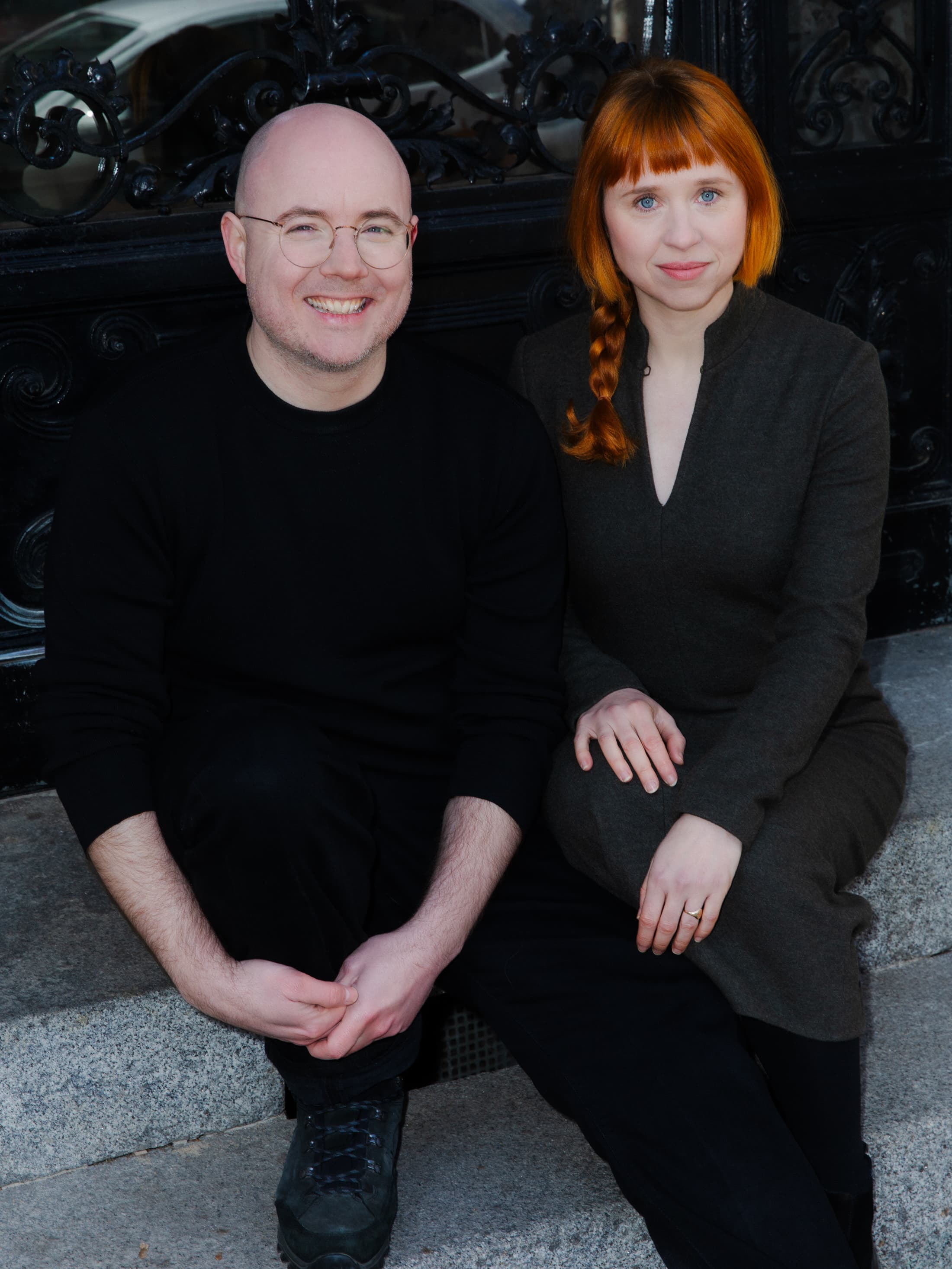
Holly Herndon and Mat Dryhurst are two artists who in their unique way are exploring the opportunities and risks of using Artificial Intelligence in the production of music. In particular they are interested in the question of how the use of the human voice will change in music against the background of the digital revolution. If, in the most general terms, our concept of the “naturalness” of a voice shifts, what does this mean for the special relationship between the voice and the soul and the individuality of the human being? And to whom does our own voice actually belong when it is digitally simulated?
Holly Herndon began her career as a musician. For her debut album, Movement (2012), she created a world made up exclusively of samples of her own voice and of her breathing, resulting in a world as rhythmically varied as it is rich in its range of sonorities. As she explained in an interview that she gave at the time, her laptop is no longer a work tool but is a prosthesis, an artificial limb, with which her subjectivity has been completely merged. Since then Herndon has continued to work with Mat Dryhurst, her partner both in real life and as an artist, to develop this strand in her work. She began by using her voice and her singing to train a form of artistic intelligence to sing in exactly the same way that she does. In Holly+ (2021) she made it possible for other artists to interact with her cloned voice and in that way to create new works.
At the same time Herndon and Dryhurst have designed a search engine that they have called “Have I Been Trained” and that allows artists to find out if their own art has been used to train artificial intelligence and, if necessary, to refuse to let it be used in this way. They also built an opt-out for images online and two billion images have been opted out, which is recognized by many model trainers. This approach has been referenced by both the EU and UK in their AI data strategy. Holly Herndon and Mat Dryhurst believe the public should have agency over their data and also are advocates for public data sets aka data sets in the public domain outside of corporate structures.
Their most recent exhibition was held at London’s Serpentine Gallery: for The Call they fed a form of artificial intelligence with sound recordings of fifteen community choirs in Great Britain and created an interactive audio installation inside a chapel-like space: a place for new hymns and rituals in the digital age.
On May 25 2025 May Holly Herndon and Mat Dryhurst were awarded the KAIROS Prize 2025 at the Deutsches Schauspielhaus in Hamburg.
- Laureate 2024 - Salomé Jashi
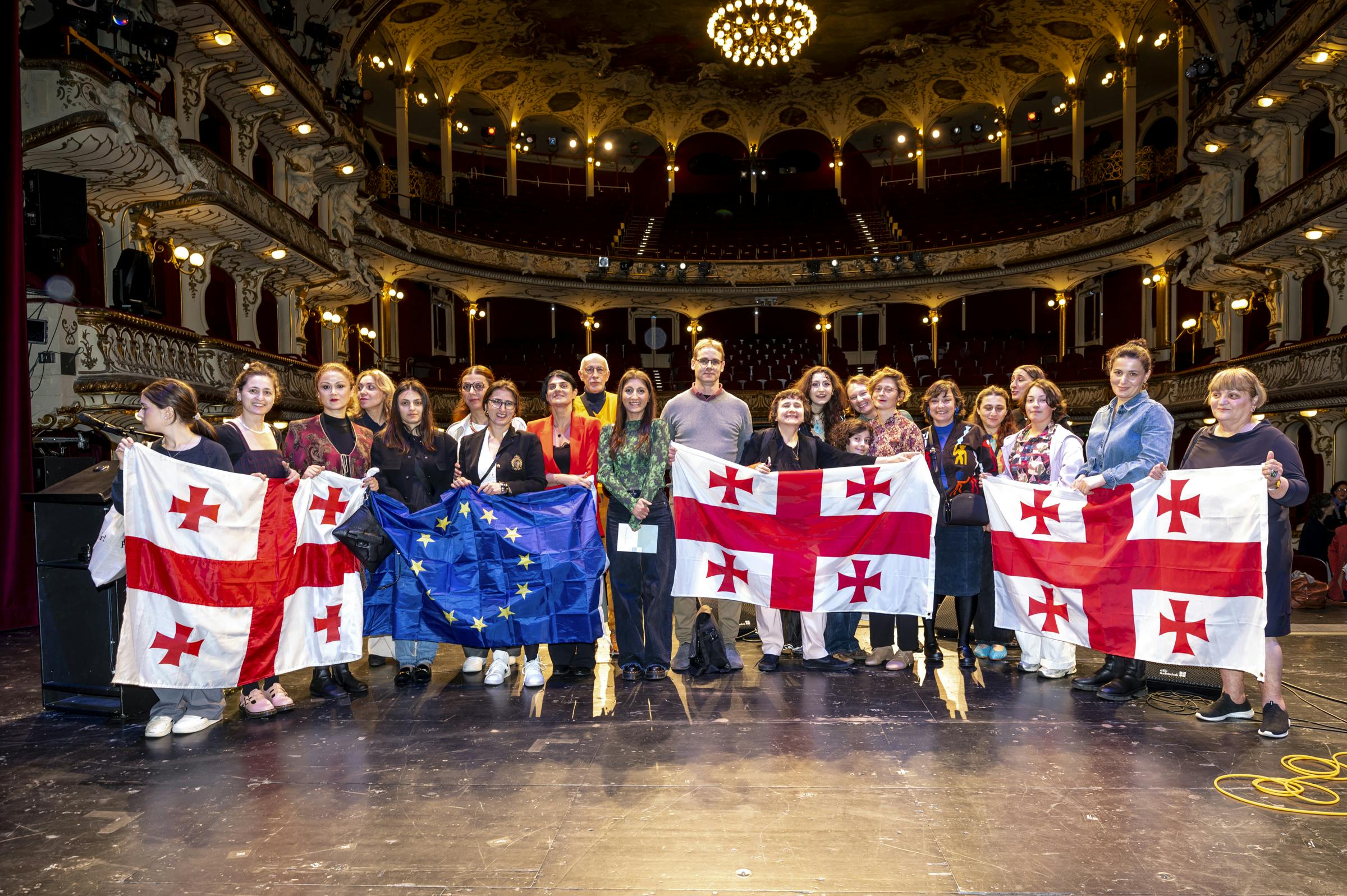
Salomé Jashi studied documentary film at Royal Holloway, University of London and is a member of the European Film Academy as well as co-founder and chair of the Documentary Association Georgia and produces her films through Sakdoc Film. Her film Taming the Garden premiered in the 2021 Sundance Film Festival Documentary Competition and Berlinale Forum and was nominated for the European Film Award.
Georgian documentary filmmaker Salomé Jashi, born in Tbilisi in 1981, follows the absurdities, distortions and hypocrisies of post-socialist Georgia with her camera eye. With great sensitivity and calm, she gives people and events space in her films and allows us as the audience the time and freedom of thought to interpret the filmed events. Jashi often focuses on the relics and lifeless shells from the immediate history, whose power rituals and empty promises she exposes. In her internationally recognized documentaries, historical narratives are questioned, unheard voices are made audible and new perspectives are made visible. The filmmaker follows the protagonists of her films with alertness and curiosity, and thus succeeds in capturing new perspectives and surprising twists and turns. She creates beguilingly strong, impressive images and listens carefully to what people say, just as she listens patiently to animals and landscapes.
As bold and politically charged as her films are, they are always humorous and a pleasure to watch both aesthetically and narratively. Her work can be enjoyable, but it is not surprising that not everyone likes it. In her native Georgia, she regularly causes offense by confronting the vanities of the politically powerful with an unerring gaze and consistent storytelling. Salomé Jashi says and shows what is. "With a view to Europe and the strengthening of national interests and historical forgetfulness, the KAIROS Prize 2024 also honors Salomé Jashi and her work for respectfully telling and looking at the history(ies) of others and for enduring contradictory attitudes. Here, art opens up new worlds, spaces for encounters and builds bridges, not least between East and West," says the KAIROS jury, explaining the choice of the prizewinner.
On May 5, Salomé Jashi was awarded the KAIROS Prize 2024 at the Deutsches Schauspielhaus in Hamburg.
Speeches Kairos Prize 2024
- Laureate 2023 - Alona Karavai
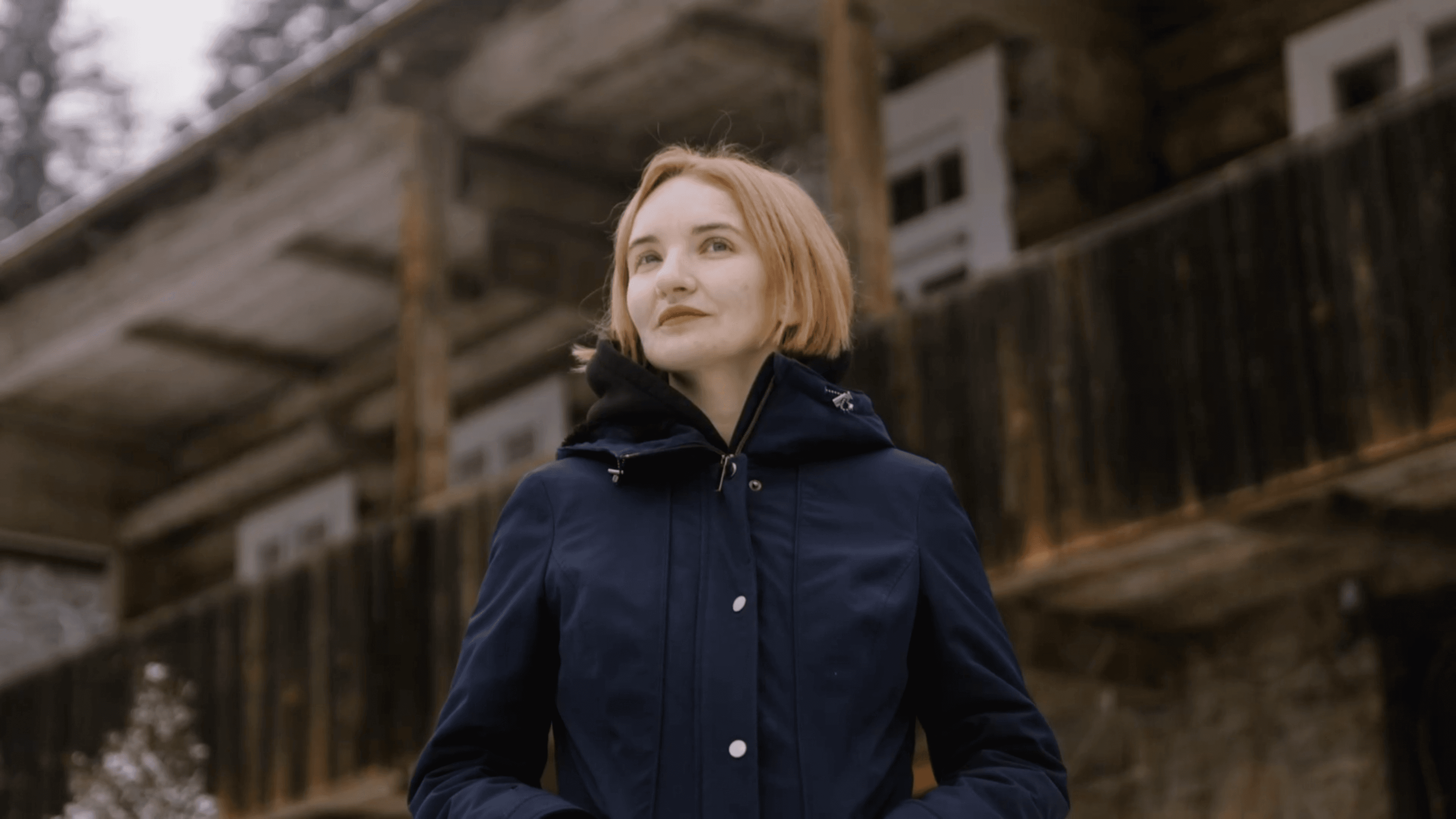
Curator and cultural manager Alona Karavai has co-initiated series of events, educational programs and residencies in Ukraine and led them to success, including the art spaces of Asortymentna Kimnata in Ivano-Frankivsk, the artist residency Khata-Maysternya in the Carpathians and the nationwide educational program Insha Osvita. This creates contacts and networks between people and communities who would otherwise never meet or learn from each other.
Alona Karavai and her organizations protect artists and works of art and stand up to Russian attempts to eradicate an independent Ukrainian culture: they offer quick and unbureaucratic shelter when artists have to flee. They bring threatened works of art to safety and store them. They commission art and open their spaces for exhibitions and performances. They offer artists essentials: to be able to work, to be seen, to meet an audience.
Alona Karavai does not see herself as the author or owner of her projects. Rather, her works are always based on a collective process of profound understanding. Because she relies on participatory processes, curatorial and structural decisions are discussed and negotiated. In this sense, Alona Karavai stands for a generation of today's cultural facilitators who walk through the world unpretentiously, with great sensitivity and alert senses, in order to track down relevant questions and find artistic answers to them.
On June 4, 2023, Alona Karavai was awarded the KAIROS Prize 2023 at the Deutsches Schauspielhaus in Hamburg.
- Laureate 2020 - Agnes Meyer-Brandis
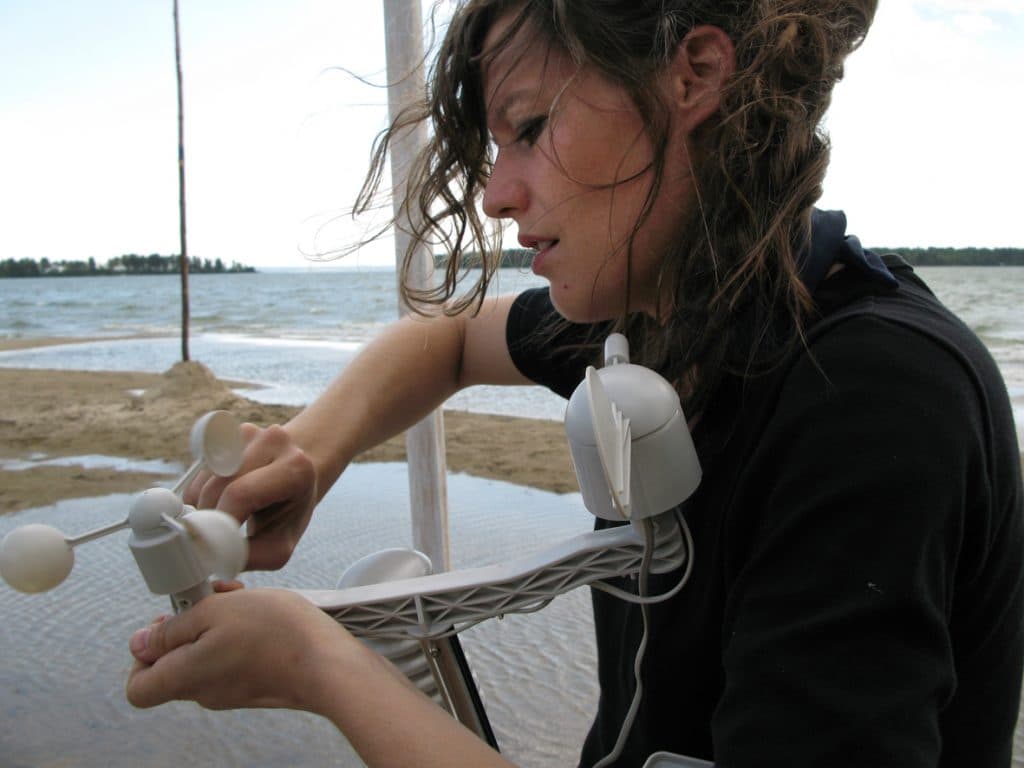
Agnes Meyer-Brandis is an unusual artist, her work unique in every respect. In her installations, films and performances, she humorously and poetically combines findings and methods from a wide range of scientific disciplines with speculative theories and fictional narratives. Founded in 2003, Forschungsfloss - an institute for art and subjective science - poses questions without providing answers and is thus very much in the tradition of modern art. Climate and space research, meteorology, synthetic biology, botany and geology are just some of the sciences that appear in her work. The artist flies geese to the moon, lets Finnish fir trees make tea or enables exhibition visitors to have a biochemical conversation with a tree.
Agnes Meyer-Brandis studied at the art academies in Maastricht, Düsseldorf and Cologne. Her work "Bohrkernlabor und Elfen-Scan", which uses a scanner to examine drill cores for elves and other life forms invisible to the naked eye, was created there in the year she graduated. The subtle use of interactivity as a method of storytelling already characterized this early work - in general, she is an excellent story inventor and storyteller.
Her Moon Goose Project, initiated in 2008, is inspired by the fantastic 17th century tale "Man in the Moon" by Frances Godwin, which describes an adventurous journey to the moon in a vehicle pulled by geese. Agnes Meyer-Brandis has updated this story: she has raised moon geese, given them astronaut names, trained them to fly, undertaken expeditions and housed them in a habitat modeled on the moon. Precisely because Agnes Meyer-Brandis makes neither political nor didactic claims with her work, she opens up completely new, different approaches to nature and science and thus sharpens our view of topics such as climate change and environmental protection.The award ceremony, originally scheduled for April 2020, was rescheduled for October 17, 2021 at the Hamburger Kunsthalle.
- Laureate 2019 - Nihad Kresevljakovic
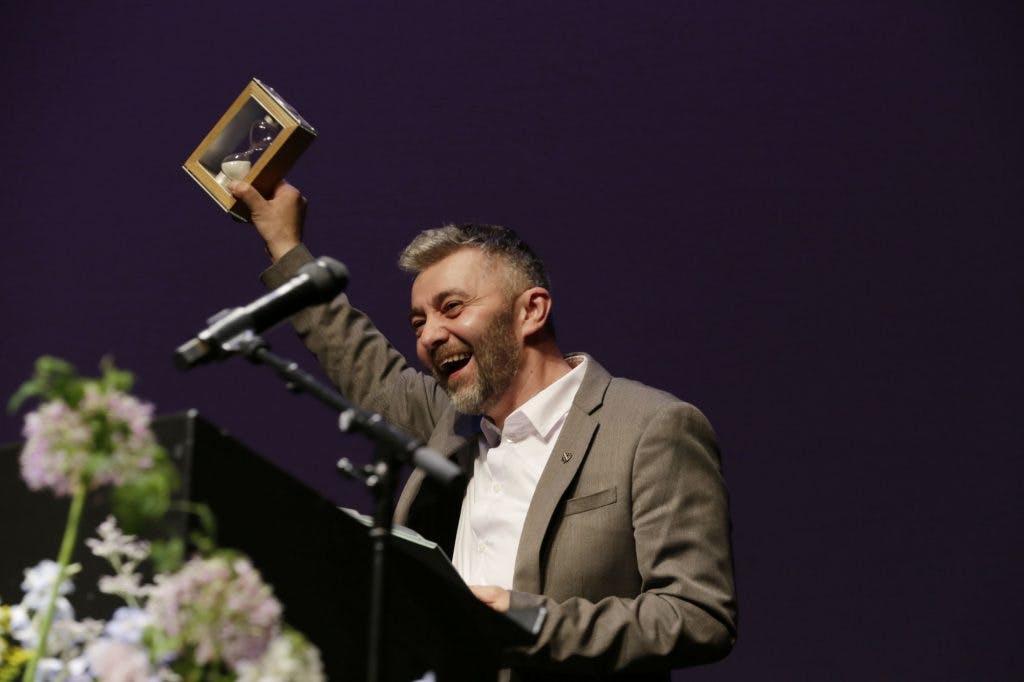
KAIROS award ceremony 2019
Nihad Kresevljakovic is the programme director of the MESS International Theatre Festival in the Bosnian capital Sarajevo. Founded in 1960, MESS is one of the most established and highly respected festivals in Southeast Europe. During the four-year-long sacrificial siege of the city by Bosnian Serb troops, the festival was forced to take a break. However, as an act of cultural resistance, the theatre management at the time organised the first film festival in the besieged city, creating the predecessor of the Sarajevo Film Festival we know today.
After the end of the war, the MESS was taken over by young theatre-makers who were able to attract a new generation of visitors with enthusiasm and artistic quality without losing the regular audience. The history of this festival shows that art can provide comfort, encouragement and meaning, especially under the most adverse circumstances, and can become a cultural as well as a real place of escape.
Nihad Kresevljakovic studied history at the Faculty of Philosophy at the University of Sarajevo. During the Bosnian war, he documented events and daily life under siege in his hometown with his camera. This footage resulted in a video library containing over 1000 hours of footage, which eventually led to the founding of the local NGO Video Archive.
Nihad Kresevljakovic is a multi-talented cultural enabler, a diplomatic networker, a role model and mentor for many colleagues. He counters the political and economic gloom in his homeland with a mixture of idealism, perseverance and pragmatism. With him, the KAIROS Prize curatorship is honouring the vital but completely underfinanced cultural scene of a battered region, whose actors are rarely noticed and even more rarely appreciated in Western Europe.
On 28 April, Nihad Kresevljakovic was awarded the KAIROS Prize 2019 at the Deutsches Schauspielhaus in Hamburg.
- Laureate 2018 - Dr. Jan Gerchow
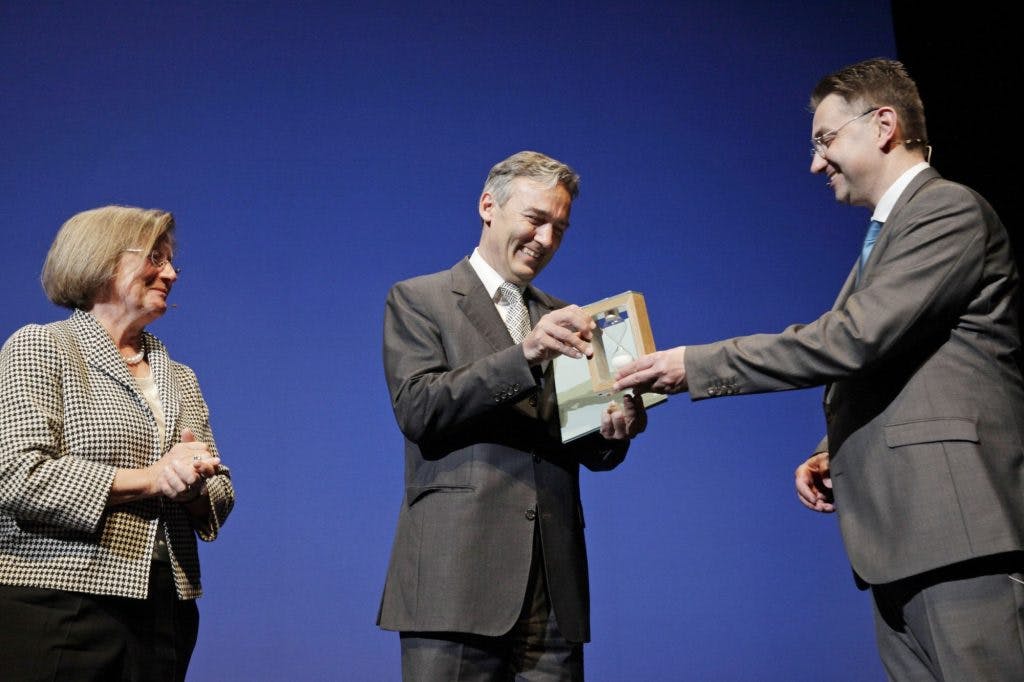
Award ceremony 2018
A city museum offers space for enlightenment and understanding about the common past, present and future. It is a place for reflecting on the city's glories and regrets, suitable for the loving preservation of monuments as well as for the productive shattering of local myths. Together with his team, Jan Gerchow has developed the Historical Museum in Frankfurt am Main into a vital place for Frankfurt's urban society to locate itself and find its identity.
Jan Gerchow, born in Braunschweig in 1958, studied history, German studies and philosophy in Freiburg and Durham (UK). He completed his doctorate at the University of Freiburg in 1984 on the early medieval history of England. After working at the Max Planck Institute for History in Göttingen and the Ruhrland Museum in Essen, he was appointed director of the Historical Museum in Frankfurt am Main in 2005. There he is not only responsible for the usual services and functions of a large city museum - the renovation and new construction of the museum buildings as well as the new conception of the exhibitions also bear his signature. The elaborately renovated old buildings such as the "Saalhof" were opened in 2012, the large new buildings in October 2017. One of the most spectacular exhibits is an oversized snow globe with artistically designed models on the theme of "Typically Frankfurt". A look inside the globe provides answers to the question of how Frankfurt became what it is and how the city differs from others.
"Europe's big cities are experimental fields of the future. It is in the cities that we find out whether the European matrix of unity through diversity is capable of survival and whether we can continue to preserve an indispensable consensus when stormy changes in economic, social, linguistic, cultural and religious conditions call everything familiar into question and throw up rifts. If the city succeeds as a pattern of life, it provides answers to the destructive tendencies of our present, such as fragmentation, desolidarisation, nationalisation and atomisation. As laboratories of peaceful consciousness-raising, modern city museums can achieve enormous effects. Jan Gerchow has combined the best strategies with pinpoint accuracy and transformed his new house into an exemplary place for community building," according to the reasoning of the prize curators.
Jan Gerchow himself is convinced that "the city is the only thing that all the people who live there have in common: Not origin, religion or any national identity, but the city is what they share. To get into a conversation about that, to explore the city, to explore the historical dimension in the current one - that's what it means to make a city museum."
On 22 April, Jan Gerchow was awarded the KAIROS Prize 2018 at the Deutsches Schauspielhaus in Hamburg.
- Laureate 2017 - Inci Bürhaniye & Selma Wels
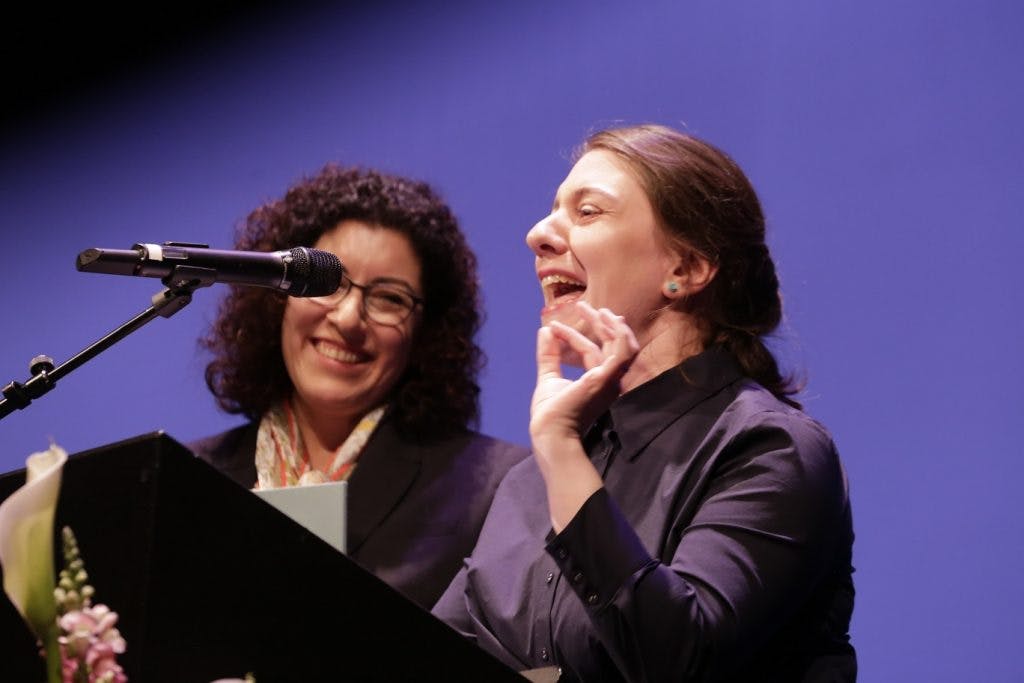
Award Ceremony 2017
What to do if you want to read books by young Turkish authors but don't know the language? Until the binooki publishing house was founded, the only option for interested readers was to take a Turkish course. Thanks to the two sisters Inci Bürhaniye and Selma Wels, the works can now also be read in German. binooki is the only publishing house dedicated to the translation of Turkish literature into German, thus making a contribution to the - especially at present - urgently needed cultural exchange. For their entrepreneurial courage, their pioneering spirit and their cultural mediation work, the publishers are awarded the KAIROS Prize 2017.
Inci Bürhaniye and Selma Wels founded binooki Verlag in Berlin in 2011 - out of love for Turkish literature and inspired by their mother, who instilled in them a passion for reading. Before this foundation, both sisters had little contact with publishing. Inci Bürhaniye studied law and still works today as a specialist lawyer for corporate, commercial and tax law with her own law firm in Berlin. Selma Wels studied business administration and worked independently for the film industry until she founded the publishing house. Now she is the managing director of binooki Verlag and has meanwhile translated two literary works from Turkish into German.
From the beginning, it was important to both of them to give a modern urban Turkish literature a German voice without using old stereotypes. The publisher's motto "Achtung! Cliché-free zone" is therefore not just an assertion, but a claim that the publishers want to live up to with every publication.
"Intercultural exchange is based on the mediation work that binooki Verlag does in a great way. This ambition takes on additional relevance in view of the current demarcation and front formation in Turkey towards the West and Western culture. The two publishers are bridge builders. They enable a deeper understanding of Turkish culture - and they pave the way for a sense of belonging that transcends the political borders of the EU and raises awareness of Turkey as a European state. Last but not least, the prize also signifies recognition and support for Turkish intellectuals, publicists and writers who speak out in a time of repressive measures and personal danger," according to the statement of the prize curators.
On 7 May 2017, Inci Bürhaniye and Selma Wels were awarded the KAIROS Prize 2017 at the Deutsches Schauspielhaus in Hamburg.
- Laureate 2016 - Teodor Currentzis
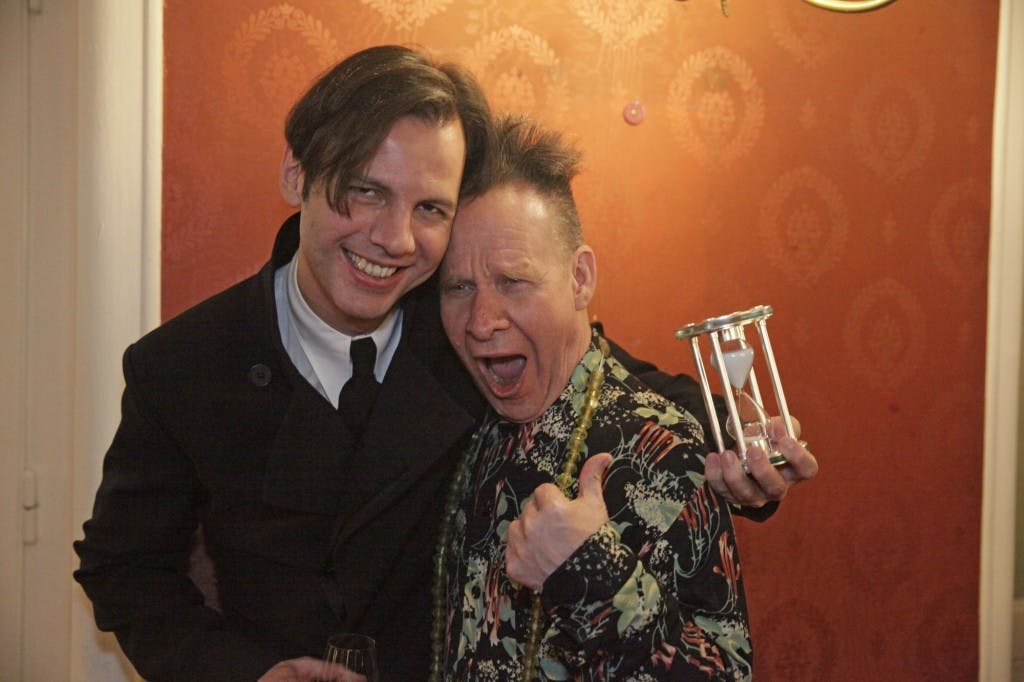
KAIROS award ceremony 2016 - Teodor Currentzis with Laudator Peter Sellars
With Teodor Currentzis, the prize curators honour not only an exceptional musician, but also an artist who uncompromisingly defies the constraints of the modern music business across genres. With his radical interpretations, the Greek-Russian conductor causes a worldwide sensation in the routine classical music scene and acts with unmistakable style, dedication and the courage to take artistic risks.
Teodor Currentzis is music director of the Perm Opera and Ballet Theatre in Russia as well as director of the award-winning orchestra MusicAeterna and the choir of the same name. The city of Perm in the foothills of the Urals is the easternmost city in Europe and more than 1000 kilometres from Moscow. Built as a garrison town, it became an important location for the armaments industry during the Second World War and was also cut off from the outside world during the Soviet period. A large Gulag camp existed in the post-war period. Perm does not at first seem an obvious place for great interpretations of Mozart, Beethoven or Rameau - yet Currentzis says in an interview with DIE ZEIT "I am happy in this city, which was punished by the Soviet Union for its loyalty to the Tsar. Perm was sealed off under communism, a city built with the blood of political prisoners from the surrounding gulags. But it was also home to the intelligentsia released from the camps. This created a climate for avant-garde culture." Currentzis and his ensemble carry Perm's reputation beyond Russia's borders, with tours to Spain, Germany, Austria and Switzerland - as "an opera empire from which the rest of the music world could learn a thing or two" (DIE ZEIT).
Teodor Currentzis, born in Athens in 1972, began studying conducting in his native city in 1987 before continuing his studies at the St. Petersburg Conservatory with Ilya Musin from 1994 to 1999. From 2004 to 2010 he was chief conductor at the State Academic Opera and Ballet Theatre in Novosibirsk, the largest opera house in Siberia. There he founded an original sound ensemble and choir, which later became the MusicAeterna Orchestra and Choir.
Currentzis has lived and worked in Perm since 2011. This year, the Perm Opera House has been nominated 26 times for the "Golden Mask" award of the Russian Theatre Association - a record in the history of this prize. Currentzis has received an ECHO Klassik for his recordings, among others, as well as the "CD of the Year" award from "Opernwelt" twice in a row for his previous recordings of Mozart's Da Ponte cycle, which he is currently completing under his exclusive contract with Sony Classical.
The presentation of the KAIROS Prize to Teodor Currentzis took place on 8 April 2016 at the Deutsches Schauspielhaus Hamburg. The laudatory speech was given by the American theatre director Peter Sellars.
- Laureate 2015 - Eike Roswag
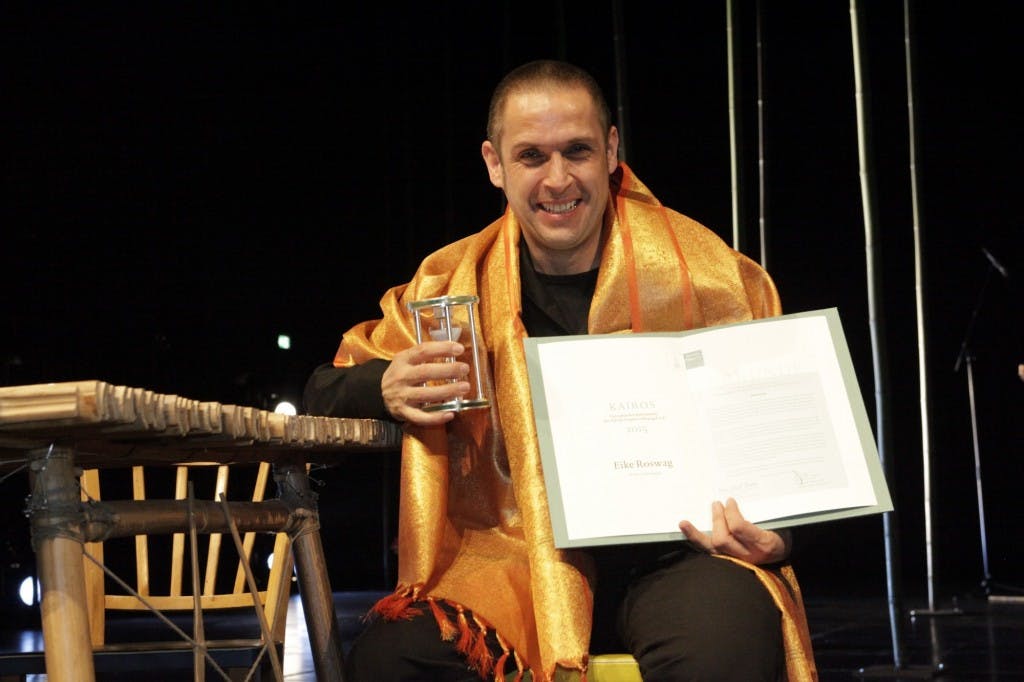
KAIROS award ceremony 2015
With his Berlin office Ziegert|Roswag|Seiler, architect Eike Roswag specialises in sustainable building. The building projects span a wide range from residential and commercial buildings in Germany, to schools in Asia and Africa, to monument conservation in Islamic countries.
The development and realisation of natural building constructions from traditional, local building materials such as clay, wood and bamboo are at the centre of his activities. Low-energy and plus-energy houses, which can do without ventilation systems due to the climate-controlling effect of clay and wood, represent a special contribution to the sustainability discourse.
Eike Roswag stands for architecture that is created as a collaborative effort between society and professionals. His buildings are not artistic solitaires, but the result of a cultural process based on respect for future users and local craftsmen. Eike Roswag is convinced that architecture should always be created in dialogue with the people involved, as participation and the possibility of co-design during the planning and realisation of the buildings enable custom-fit, individual solutions.
The KAIROS Prize Board emphasises that Eike Roswag "takes an original position in an increasingly technological society and economy and stimulates an important discourse on whether it is not also possible to create durable, energy-efficient architecture that is equally 'healthy' for people and nature with modesty and a return to natural resources." At the same time, Roswag always emphasises aesthetics and proves with his buildings that architectural beauty and sustainability are not mutually exclusive.
Eike Roswag and his office were awarded the Aga Khan Award for Architecture 2007, the Holcim Award in Gold in Asia Pacific 2011 and the BDA Prize Berlin 2013. In autumn 2013, he was a fellow at the Villa Massimo in Rome, where he conducted dialogues with various partners on working methods in an architectural context. The office's projects have been shown in a number of exhibitions, e.g. at the Museum of Modern Art in New York, and have been widely published.
Eike Roswag was awarded the KAIROS Prize on 22 February 2015 at the Deutsches Schauspielhaus Hamburg.
- Laureate 2014 - Jasmila Zbanic
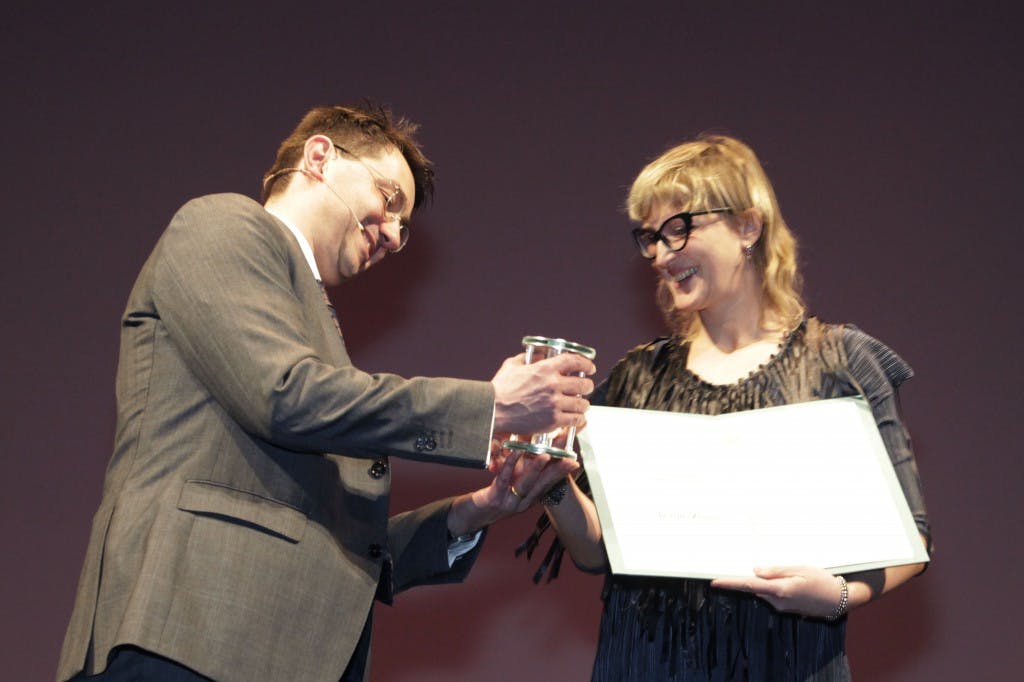
KAIROS award ceremony 2014
Jasmila Zbanic, born in Sarajevo in 1974, received her education at the Academy of Performing Arts in Sarajevo. In 1995 she went to the USA and worked as a puppet actress at the Bread and Puppet Theatre. In 1997 she came back to Sarajevo and founded a film production company.
In an exemplary way, Jasmila Zbanic shows that artistic interventions can provide decisive social impulses. Central to her work is the confrontation with the war traumas of the population living in Bosnia. She pleads for a fearless coming to terms with the crimes, but also for reconciliation, for a healing process. With films like Esma's Secret, which won the Golden Bear for Best Film at the Berlinale 2006, Jasmila Zbanic demonstrates an independent artistic handwriting; at the same time, she sees her work as a survival strategy, because it gives the speechless victims a voice and a new perspective. She tries to show how one can break through the lethargy of traumatisation and build one's own life, says the director.
Through her masterful use of film-aesthetic means, her surprising pictorial inventions and not least through her often whimsical humour, she succeeds in defining this reconstruction work as a vital cultural achievement, as a contribution to a mental paradigm shift in a deeply insecure country. In this way, she also intervenes directly in political events. Her film Esma's Secret sparked a broad debate on the rights of Bosnian women raped in the war - which led to these women being recognised by law as civilian war victims and entitled to pension payments. Her second feature film, Between Us, Paradise, from 2010 also premiered in competition at the Berlinale. In addition, she was represented at other renowned film festivals and at the documenta.
With consistency and great energy, Jasmila Zbanic pursues the goal of a comprehensive sensitisation for repressed topics. Last but not least, she is an ingenious networker. From the very beginning, she was keen to abandon the social isolation of the artist and instead create a climate of departure and renewal with cooperative actions. The video works, documentaries and theatre productions created in the artists' association Deblokada, which she founded, also contribute to this. With the award of the KAIROS Prize, the Board of Trustees would like to give Jasmila Zbanic's important work a European forum and draw attention to a region whose conflicts are easily forgotten in view of the current debate on Europe.
The KAIROS Prize was awarded to Jasmila Zbanic on 23 February 2014 at the Deutsches Schauspielhaus Hamburg. The laudatory speech was given by Dieter Kosslick.
- Laureate 2013 - Pawel Althamer
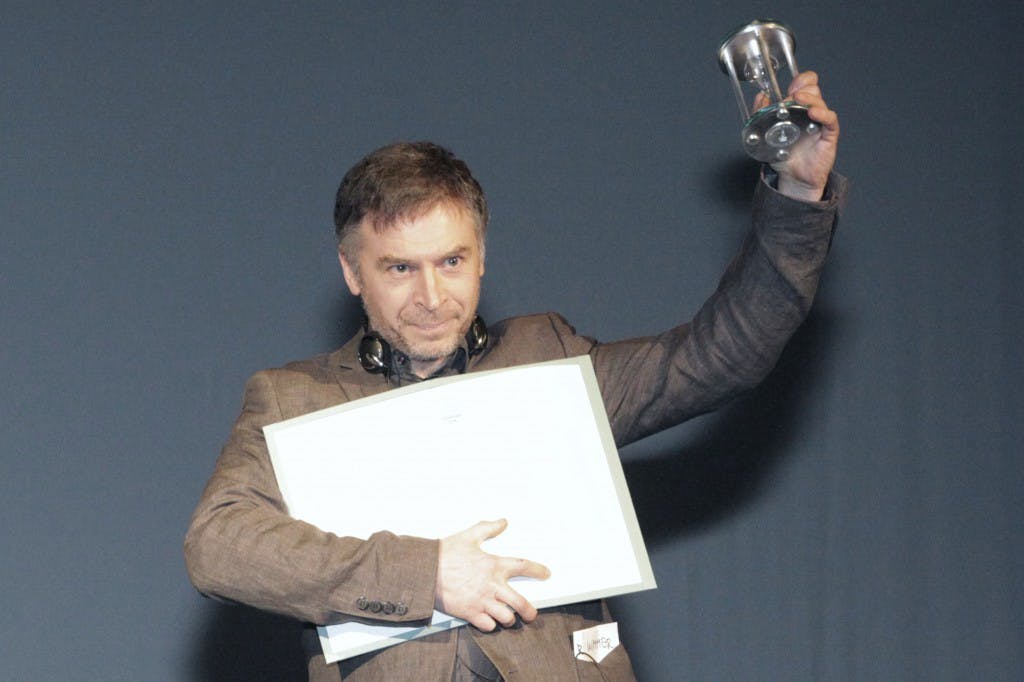
KAIROS award ceremony 2013
Pawel Althamer, born in Warsaw in 1967, studied sculpture at the Academy of Arts in Warsaw. An early artistic starting point were sculptures for which he used natural materials such as grass, wax or hair, which rot after a certain time and thus refer to the transience of art. Since the 1990s, Althamer has pursued a special form of participatory art production. These projects result not only in characteristic works, but also in unique experiences for the participants.
In 2011, for example, during the "Almech" exhibition at the "Deutsche Guggenheim", he had sculptural portraits made of visitors and exhibition guides, cleaning and security staff, senior bank employees and their customers, thus creating a monumental, collective self-portrait. Those portrayed discovered the possibility of active participation and intervention; they found themselves reflected in their sculptures and lent an individual face to the otherwise usual anonymity of an exhibition visit.
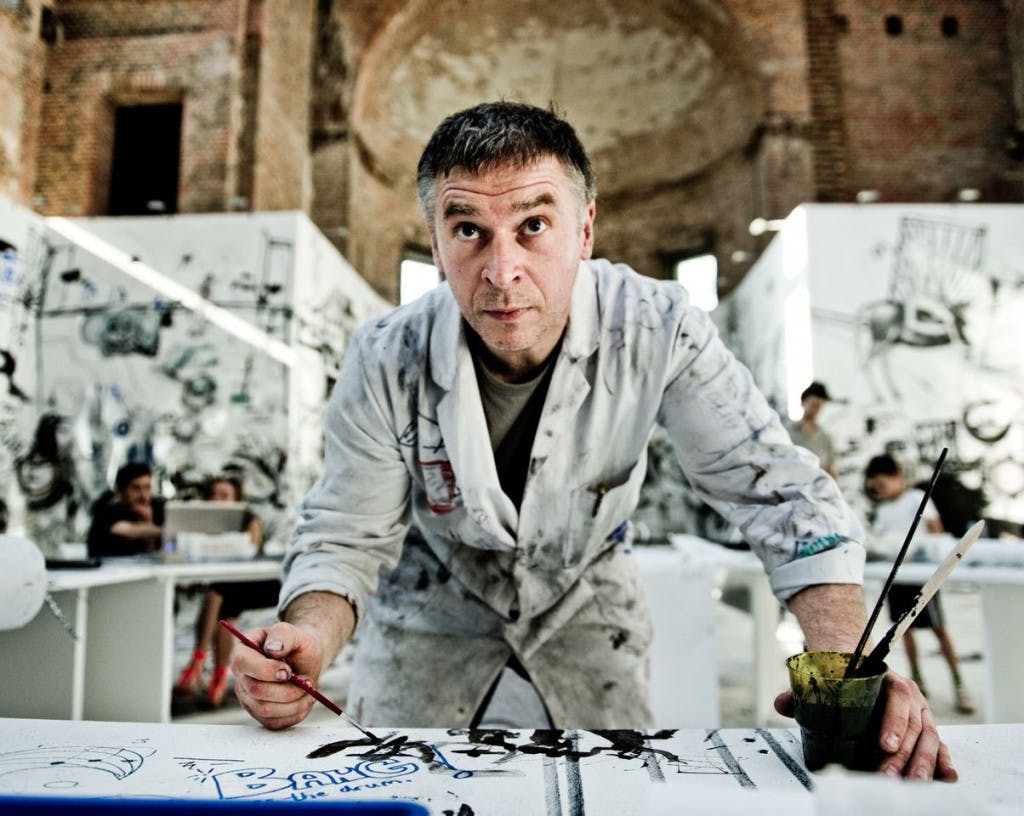
Award winner Pawel Althamer
In other performances, Pawel Althamer works with homeless people, prisoners or the seriously ill, whom he removes from their isolated social role and empowers to become artistic co-players. For almost twenty years, for example, he has led the "Nowolipie Group", a weekly sculpture workshop for patients suffering from multiple sclerosis. The artistic strategy of "social sculpture" characterises Althamer's entire oeuvre. At the turn of the millennium, he staged the collective sculpture "Brodno" with his neighbours in the apartment block of the same name. He mobilised 200 tenants to switch the lights on and off according to a special plan, so that at midnight the number 2000 became visible on the façade. This simple idea linked art and life in a convincing way, because it not only offered a visual message to the viewer, but also strengthened the community of tenants. In 2009, he transferred the role of the artist to the schoolchildren of the city of Kassel and gave them his exhibition in the Museum Fridericianum.
"Pawel Althamer answers socio-political questions about participation, justice and individual scope for action with artistic strategies that subvert familiar structures and systems of rules. How we live, how we work, which values are important to us - all this becomes conscious in a surprising way through his installations, performances and actions. He directs our attention to the seemingly self-evident or the repressed and thus combines aesthetic aspiration and social sensitivity in an unmistakable artistic creation that leaves its mark," is how the KAIROS Board of Trustees justifies its choice.
The KAIROS Award was presented to Pawel Althamer on 24 February 2013 at the Deutsches Schauspielhaus Hamburg.
- Laureate 2012 - Katell Gélébart
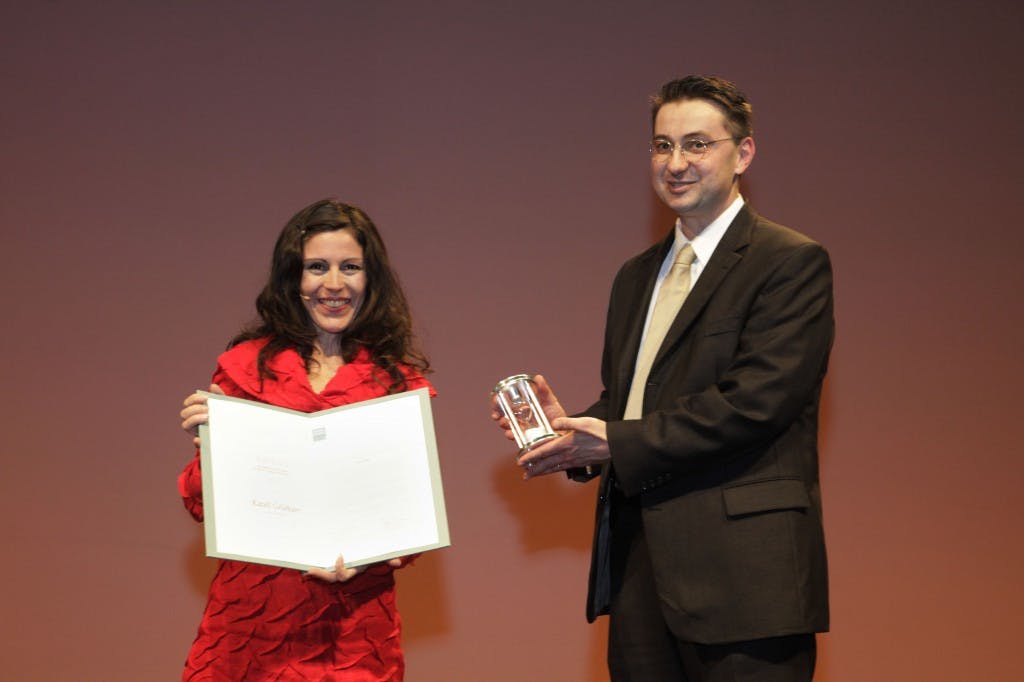
KAIROS award ceremony 2012
Katell Gélébart, born in Brittany in 1972, grew up in a creative family and discovered the world of design as a child: she made clothes for her teddy bear and furniture for her dolls from scraps of fabric and cardboard boxes she found around the house. This principle of recycling still shapes her creative work today.
First she studied art history at the Ecole du Louvre, then she did her Master's in Danish at the Sorbonne. During her studies in Paris, she got involved with various environmental organisations. She opened her first shop for recycled fashion in Amsterdam in 1998. The shop no longer exists, but its name became the programme: ART D'ECO. Under this label, Katell Gélébart has been creating clothes, bags, lamps, furniture and other objects for more than ten years. With impressive consistency, she uses only materials that are already available: Packaging from New Zealand households, silk from Indian production surpluses, felt from Soviet army stocks or old linen sacks from the German Post Office. Other designers have also discovered the concept of recycling for themselves, but Katell Gélébart has been working with this method for a long time and is leading the way.
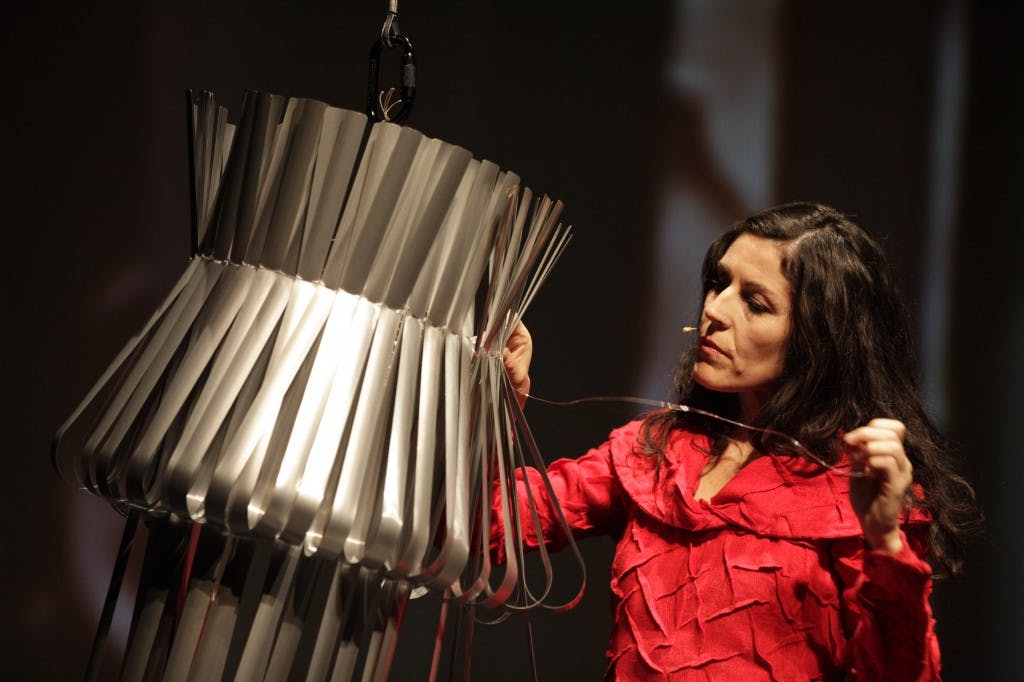
Award winner Katell Gélébart makes a lamp from old aluminum blinds
She is less concerned with refined cuts or fashion trends than with the conscious and careful use of materials. What others perceive as a limitation inspires her imagination. Creating something new without wasting resources or producing waste is both a challenge and an inspiration for them. And at the end of the creative process, unexpectedly beautiful things emerge: a raincoat made from brightly colored cat food packaging or an elegantly curved lamp made from old aluminum blinds.
However, her work holds not only an aesthetic dimension, but also an ethical one. As a modern nomad, Katell Gélébart is globally networked and always meets the people she works with with curiosity, respect and empathy. It is a matter of course for her to take local peculiarities into consideration. The sensitive approach to people and their history creates a climate of trust and opens many doors for the designer. Katell Gélébart represents her views convincingly and passionately, but does not want to denounce or proselytize. Of course, her work is a critique of consumerism, waste and superficiality, but beyond that, it excites her to recognize the aesthetic potential of things that others would throw in the trash. The KAIROS Prize therefore honors Katell Gélébart above all as a creative visionary.
The award ceremony took place on March 4, 2012 at the Deutsches Schauspielhaus in Hamburg. On the same day, an exhibition of design objects by Katell Gélébart opened at the Museum für Kunst und Gewerbe Hamburg and was on view until May 6, 2012.
- Laureate 2011 - Shermin Langhoff
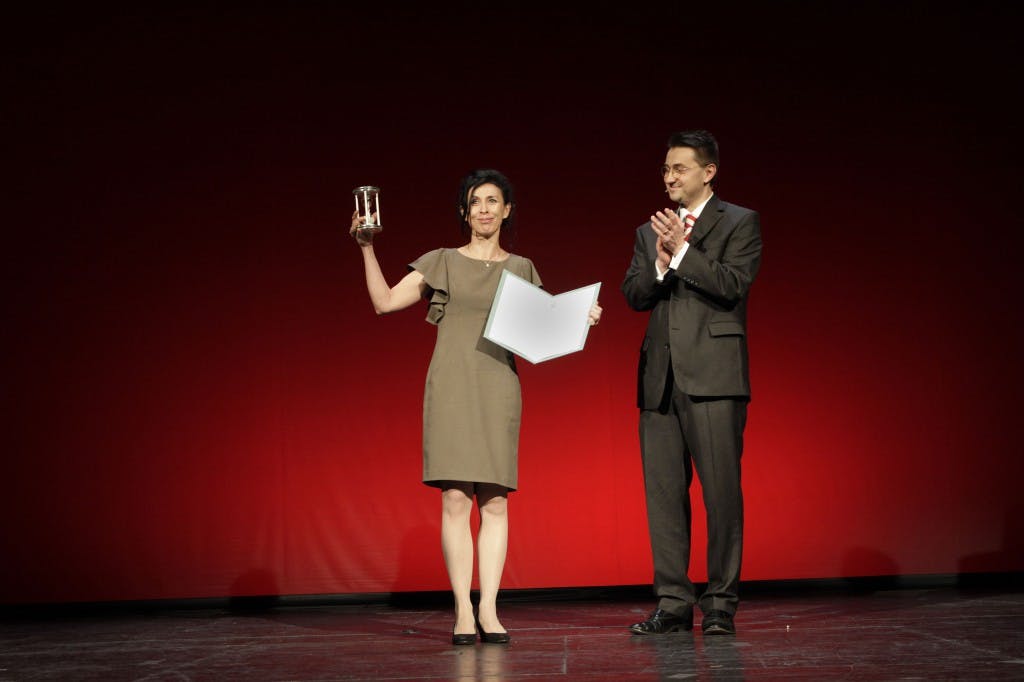
KAIROS award ceremony 2011
The theater maker Shermin Langhoff, born in Turkey in 1969, came to Germany at the age of nine and initially lived in Nuremberg. As a co-founder of the Nuremberg Cultural Initiative, she was one of the honorary initiators of film days and other intercultural exchange projects. After a traineeship in the film and television production department of NDR in Hamburg, she worked as a recording and production manager, and later as a producer and assistant director with Fatih Akin on "Gegen die Wand" (2003) and "Crossing the Bridge" (2004), among others.
In 2004, at Berlin's Theater Hebbel am Ufer, she curated the project "X-Wohnungen - Migration" with Matthias Lilienthal, in which Fatih Akin staged a theater performance for the first time. In 2006/2007, she curated two intercultural festivals that attracted attention with productions such as "Schwarze Jungfrauen" by Feridun Zaimoglu and Günther Senkel.
Shermin Langhoff has been artistic director of the Maxim Gorki Theater in Berlin since fall 2013. Before that, she worked for several years as artistic director of the Ballhaus Naunynstraße theater in Berlin-Kreuzberg. With this venue, she has established a platform for theatrical positions of the second and third generation of migrants and promotes directors, actors and dramaturges who are as yet unknown in the German theater scene. At the same time, post-migrant theater also offers space for new narratives, stories and themes - beyond ethnic attributions and clichés.
"Self-confident, determined and humorous, Shermin Langhoff enriches the theater business with outstanding plays by up-and-coming directors that are not (yet) shown on other stages. With sensitivity and flair, she discovers young talents, whom she promotes and accompanies in the long term. Shermin Langhoff is therefore honored not only as a director, but also as a mentor for culture," according to the KAIROS award jury.
The award ceremony took place on February 27, 2011 at the Deutsches Schauspielhaus in Hamburg. The laudatory speech was given by Fatih Akin.
- Laureate 2010 - Andri Snær Magnason
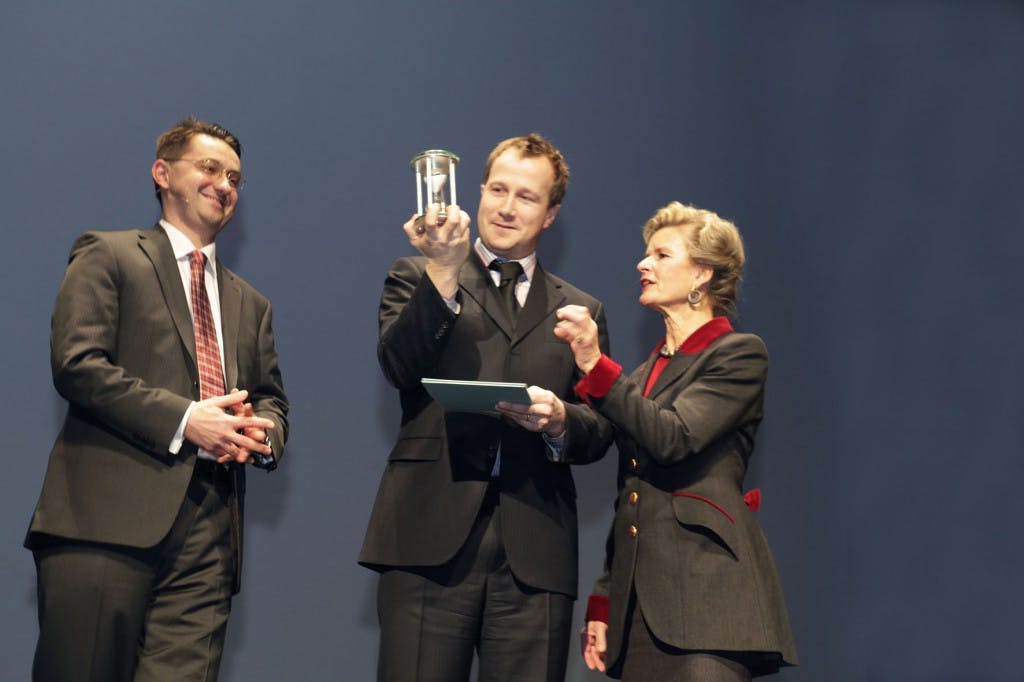
KAIROS award ceremony 2010
Icelandic author Andri Snær Magnason was born in Reykjavik in 1973. His novel "Dreamland," which achieved record sales in his homeland, made Magnason internationally famous. "Dreamland" is a polemic about the self-deception of a nation: long before the financial crisis brought Iceland to the brink of insolvency, Andri Snær Magnason warned against the unbridled version of turbo-capitalism and opposed the sellout of Iceland's nature to internationally operating aluminum corporations. With "Dreamland," Magnason became 'Iceland's Al Gore' and placed himself at the forefront of a powerful but unideological environmental movement.
"Andri Magnason has reversed the contemplative relationship that poets have had with nature for centuries, and from singing about and internalizing nature he has gained an active, militant stance. Poetry and planetary commitment, aesthetic sensibility and civil resistance are not mutually exclusive in his work, but rather condition each other," reads the statement of the KAIROS prize curators.
The award ceremony took place on February 28, 2010 at the Deutsches Schauspielhaus in Hamburg. The supporting program featured the Icelandic singer Emiliana Torrini and other musicians from the award winner's home country.
- Laureate 2009 - Sidi Larbi Cherkaoui
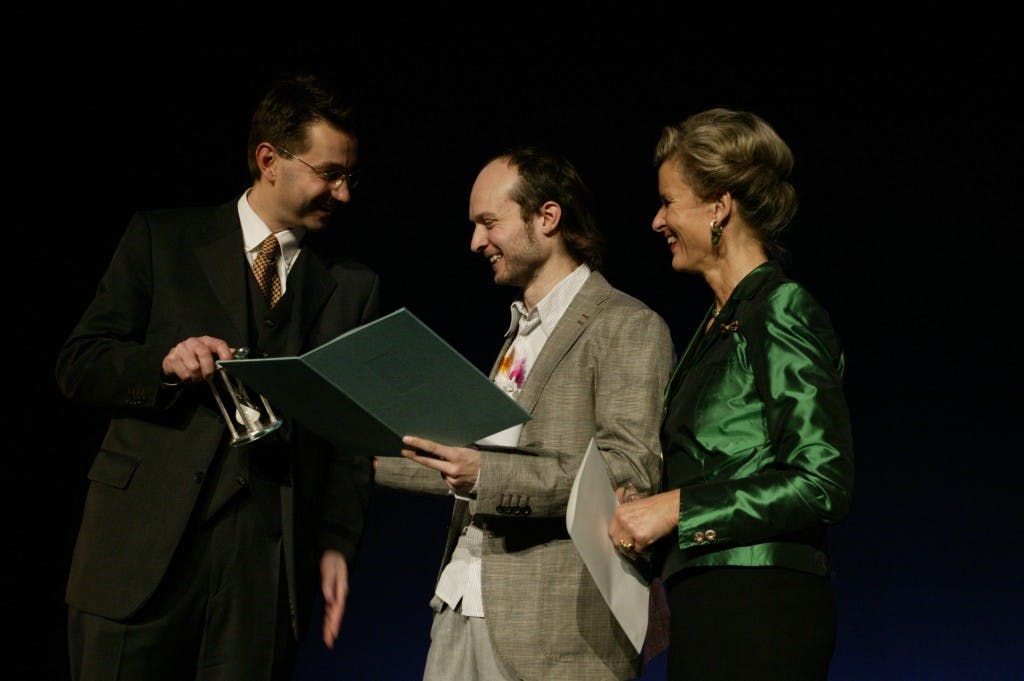
KAIROS award ceremony 2009
The Belgian-Moroccan choreographer Sidi Larbi Cherkaoui translates fundamental questions of our existence into fascinating dance performances. His unusual career began with imitating music videos. He danced hip hop, jazz and performed as a gogo dancer. At the age of sixteen, he began classical dance training and won the first prize for the best Belgian young solo in Ghent in 1995. His first choreography, Anonymous Society, enjoyed success in 1999. Works followed, the best known of which are Foi, Myth and Apocrifu. With the three works Sutra, Babel and Puz/zle, he quickly became the acclaimed star of his profession.
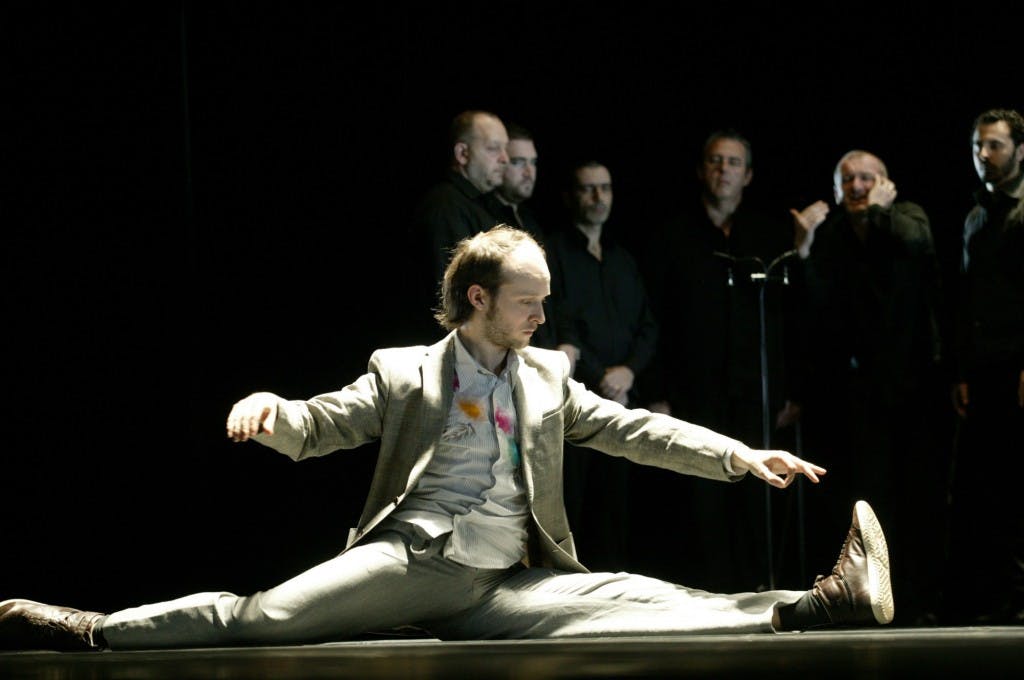
Laureate Sidi Larbi Cherkaoui "dances" his speech
"Wordless but powerful, the art of this choreographer promotes empathy, thoughtfulness and curiosity," is how the KAIROS Prize Board of Trustees described the fascinating effect of Cherkaoui's productions.
The KAIROS Award ceremony took place on February 15, 2009 at the Deutsches Schauspielhaus. With the prize money, Sidi Larbi Cherkaoui realized a long-cherished dream and built up his own dance company EASTMAN in Antwerp.
- Laureate 2008 - Tímea Junghaus
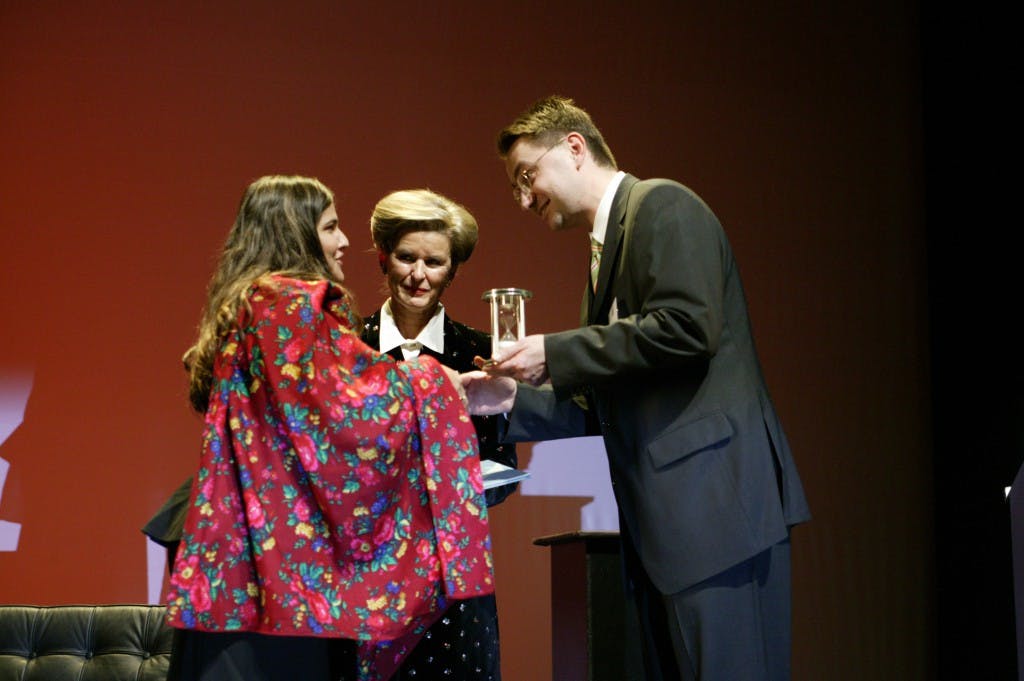
KAIROS award ceremony
Tímea Junghaus is a curator and the first Roma art historian in Hungary. She received the KAIROS award for her great personal commitment, with which she, as a cultural activist, has repeatedly found and continues to find ways to open up the contemporary visual arts of the European Roma beyond existing clichés. At the same time, she raises public awareness of the Roma's contribution to cultural diversity in Europe.
Tímea Junghaus has directed the Roma Cultural Participation Project at the Open Society Institute in Budapest since 2005. At the 52nd Venice Biennale, she curated the first transnational Roma pavilion, Paradise Lost. For this pavilion, she assembled works by sixteen European artists representing the entire spectrum of contemporary art: Painting, video art, installation, sculpture, graphics. In 2013 she founded Gallery8 for contemporary Roma art in Budapest.
- Laureate 2007 - Albrecht Dümling
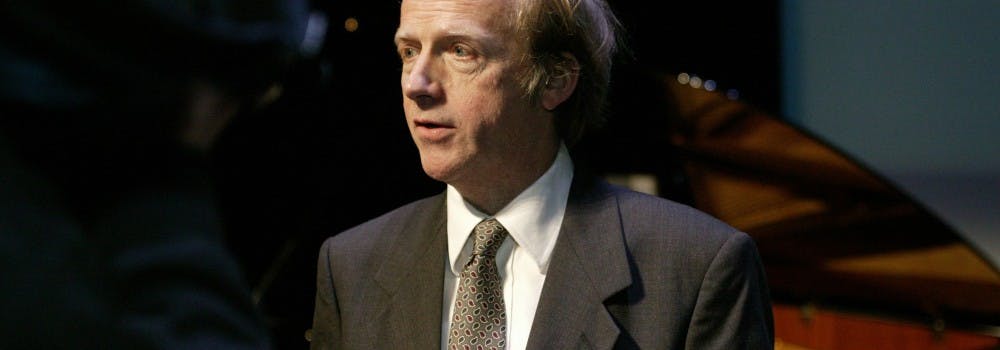
KAIROS award ceremony 2007
The first KAIROS prizewinner in 2007 was the Berlin musicologist Dr. Albrecht Dümling. Since 1990, he has headed the musica reanimata association, which is committed to the rediscovery of composers who were persecuted by the National Socialists at the time and whose works were ostracized.
Albrecht Dümling was honored in particular for his services as a musicologist and music mediator in the rediscovery of composers persecuted under National Socialism and their works. As an exhibition organizer, publicist, advisor and long-time chairman of the "musica reanimata" association, he has drawn the attention of the concert world to unjustly forgotten artists and made their works accessible to musical performance practice. However, the work of the association - research, archiving, concerts - is far from done, and therefore deserves broad support.
The award ceremony took place on January 28, 2007 at the Deutsches Schauspielhaus in Hamburg.
Contact

Uta Gielke Deputy Program Department Management, Program Management Culture
+49 40 33 402 – 14gielke[at]toepfer-stiftung.de